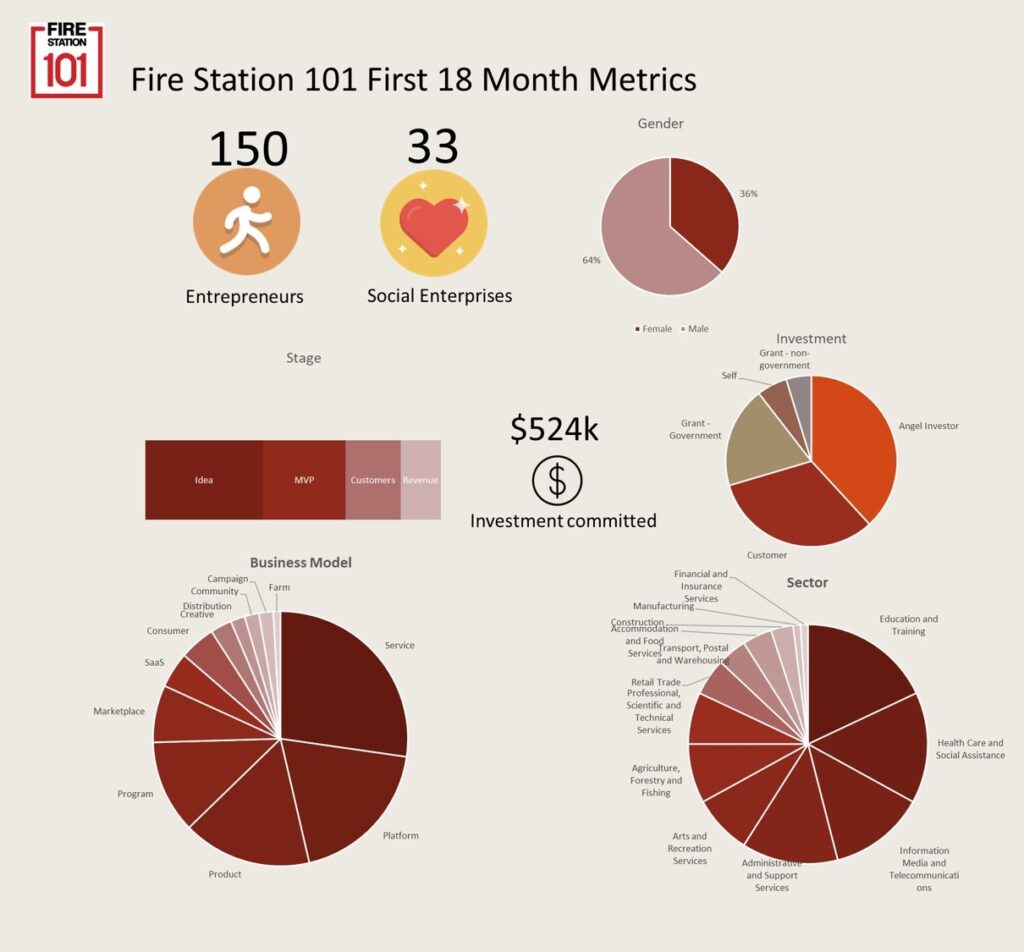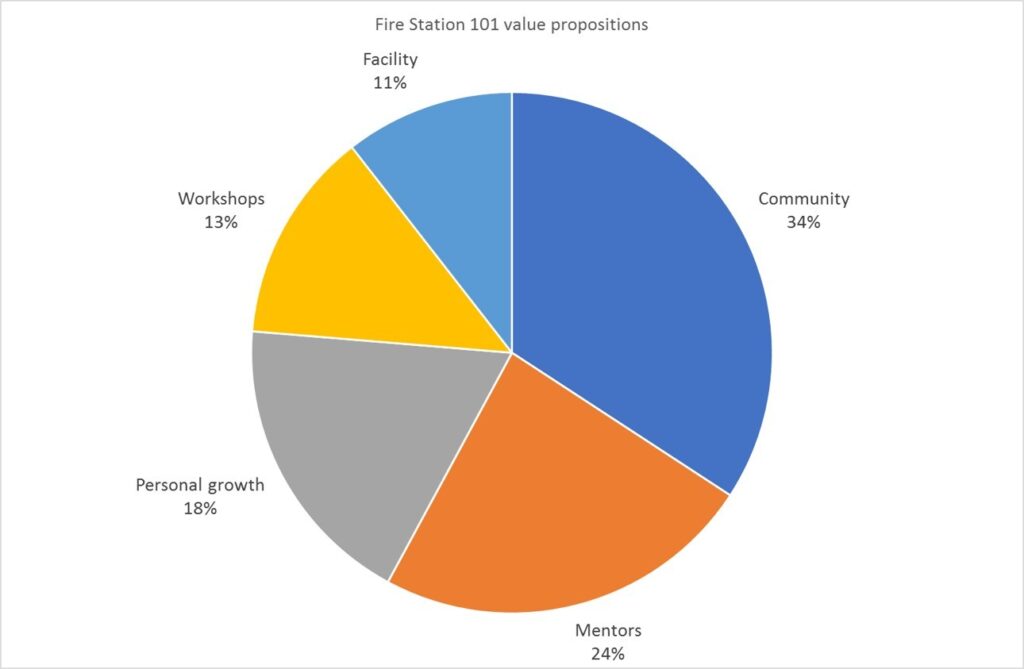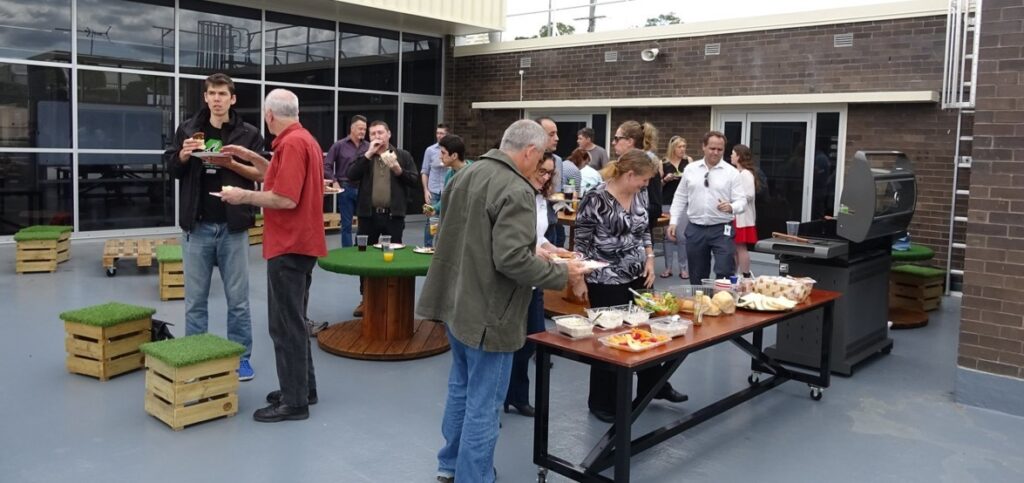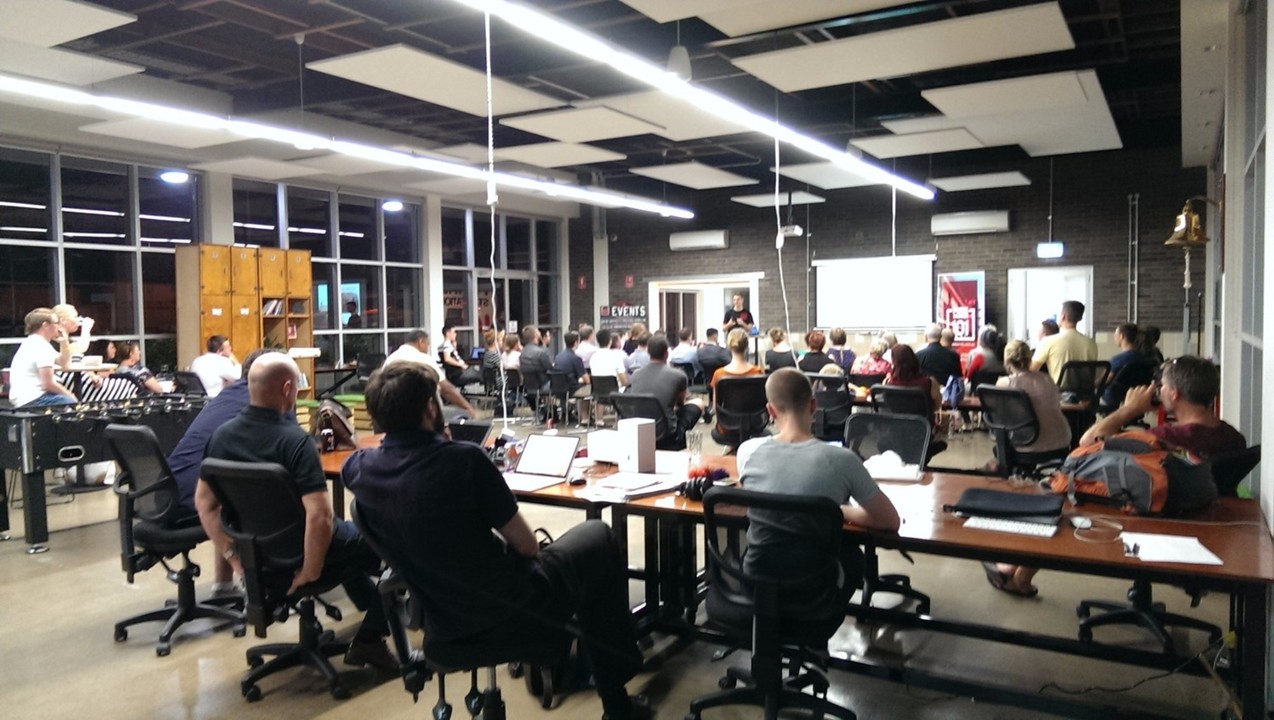Fire Station 101: The first 18 months of an innovation hub
It has been 18 months since the launch of Fire Station 101, Ipswich City Council’s innovation hub. As the hub prepares to transition to its next stage of growth, I capture some insights and outcomes from my personal perspective as the inaugural Community Manager. There is a book to be written which I am sure I will get to as part of my PhD, but for now this somewhat lengthy blog post will need to suffice.
Outcomes and model

After launching with 18 members, Fire Station 101 has seen over 150 startups, entrepreneurs, and small businesses come through the doors. At any given time, we have between 50 to 60 members. This is significant given that a 2015 Queensland innovation report listed 5 startups in the region.
Before we launched, I interviewed over 30 leaders in the Australian innovation ecosystem to ask for advice. A common theme I heard from many was to “protect your core. Identify where the community is at and shift your resources to support what is needed.”
For Fire Station 101, our core has not focused on a single business model or industry sector. We have seen a predominance of early-stage companies at idea and MVP stage, but this is shifting as the overall ecosystem and services mature and our members move to customer acquisition and sustainable revenue models.
This means we need to shift our services as the core moves. We need to retain services to support ideation, introduce programming to support later stage companies, and create strong collaborations with other specialised accelerators. I am not afraid of “losing” members, as that would infer that we in some way own them.
Rather, I hope for two things for our members. First is that they leave as one role in the ecosystem – a startup founder – and return as another role – that of a mentor, corporate partner, and investor. Second, it would be my hope that some part of their engine would remain in the local region. Companies need to go where their customers are, but we can build capability and capacity in our local region to support their rapid expansion.

As an innovation hub, distinct from just a coworking space, Fire Station 101 has a mandate to help business build, grow, and scale. There are three things I look for in members:
First is passion. Starting something new is not a 9-5 gig, and we are open 24-hours for a reason.
Second is domain knowledge and experience in the sector in which they want to operate. Learning new things takes time and mental energy. If you have to learn a new industry and create new networks on top of learning how to start a scalable business, then your chances of success are much lower.
Third is what I refer to as creating a capital based business versus a service-based business. We are looking for businesses that are not just trading time for money, but creating platforms that retain ownership and can scale outside the local region and Australia. I test this with any business by asking “Who is your customer in Connecticut?” Not that Connecticut itself is special, but it is sufficiently not Ipswich to challenge thinking.
This does not mean you need to be a technology company, but you will need technology to scale. We have members as far reaching as dog food manufacturers, transport services, and even circus programs. All can be positioned to scale or create replicable models that build and retain IP.
The focus on creating local, scalable businesses is driven in part by Fire Station 101 being a government funded innovation hub with an emphasis on local economic growth and social impact and outcomes. This is distinct from other models such as venture capital, university, corporate or independent. In addition to the creation of new businesses across all sectors, over 30 of our members have been social enterprises, and we are actively looking to increase that number.
The primary industry sectors of our members are diverse. This is representative of our region and is both a strength and challenge. It is a strength in that we benefit from the diversity of ideas and resilience from access to multiple markets. It is a challenge in that we do not go to market to attract a single sector such as Agriculture or Tourism. I experienced the emphasis on specialisation in my tours of overseas markets, and will expect a greater specialisation over the next few years.
The business models of our members is also varied. While we have an emphasis on creating scalable businesses, you can expect a portion of members to be service based businesses. These businesses can act as support for other businesses in the hub, but ideally are not the dominant business model of hub members. The culture of a space filled with service based businesses is different to one with businesses trying to find ways to break outside traditional geographic and market boundaries. Other business models that have been cultivated include online platforms, physical product, scalable educational or consulting programs, two-sided marketplaces, software as a service models, consumer-based apps, creative class such as artists or musicians, distribution of third-party products, community groups, one-off online campaign platforms, and even a farm.
For investment, Fire Station 101 members have secured or committed over $520,000 in initial funding for their projects. This is a combination of angel investment, initial customers, grants from government and NGOs, and self-funding. This is the form of funding you would expect in early stage companies. We need a means to measure this activity as a lead indicator to determine the impact on the lag indicator of sustainable jobs and later-stage investment.
When tracking jobs, the initial funding has gone almost entirely to Queensland employees or contractors providing services to the Startup industry. Businesses in the hub have resulted in a dozen or so employment or contract opportunities through member engagement. This can be difficult to track as it is fluid, short-term, and can involve trading of services as the community supports each other towards success. What we look for next is the creation of sustained employment. The intent is to convert the investment into sustainable businesses who go on to create new forms of business and ongoing employment.
Other metrics we need to work on include diversity. Without intentional effort, proportions on under-represented demographics such as gender will trend towards status quo, which is not acceptable. I am excited about planned programs dedicated to female entrepreneurs and inclusion for people with all abilities.
More than just a space – a third space
These outcomes do not happen simply by having a space. Indeed, the space is the least of the value propositions recognised by members. In surveys, I ask members on a scale of 1 to 5 whether or not Fire Station 101 is helping them achieve their entrepreneurial goals. The predominance is positive, with those disagreeing with the statement citing the reason being that they are a service business or not progressing their ideas.

When pulling out themes, only 11% of respondents identify a value proposition relating to the physical space. Most identify aspects about the mentoring provided, the networking, and workshops. If we didn’t have the space they wouldn’t come, but they do not come for the space.

This is an important point, as many see Fire Station 101 or any innovation hub as the physical space. This can lead to a conclusion by institutions such as governments or corporations to either rush out and create a purpose-built facility or convert distressed real estate into coworking and promote it as an innovation hub. Four walls and WiFi do not make entrepreneurs.
Beyond the purchase of the building, Fire Station 101 actually started in the local pub and a Meetup group, seeded by Peta Ellis and Aaron Birkby from Brisbane’s River City Labs. Supported by local council, they built a community first, and the space came second.
Once physical hygiene factors such as internet and coffee are addressed, you need two things to make an innovation hub: leadership; and programs and events.
For leadership, every innovation hub has a core individual or team bringing the community together and driving outcomes. Each region across Queensland has a name associated with their innovation ecosystem, such as Sharon in Gold Coast, Troy in Cairnes, Joe and David in Townsville, Joy and Dave in Toowoomba, Jarryd in Mackay, Elize in Rockhampton, Eleanor in Bundaburg, Mark and Zach in the Sunshine Coast, and Kristine and Daniel in Longreach.
Invest in ecosystem leaders and your community will flourish.
These leaders drive the culture and facilitate and deliver the steady stream of events and programs focused on building entrepreneurial capability and capacity. Fire Station 101 has supported or delivered over 130 events, engaging over 4,000 people in the community.
I base the management of an innovation hub on two models. The first model is the concept of a third space. A third space is not work or home, but a safe place designed around a focus. Like a church around faith and religion or a football club around sport and family, an innovation hub is a third space built around entrepreneurship and scaling business.

When you walk through the door, everyone is equal. I don’t care if you are a CEO or have been unemployed for a decade. I will assume you are there to give it a go, you have everything you need, and that the only thing stopping you is you. Our job is then to bring around the entire ecosystem all focused on one thing: your success. It is up to you to do the hard yards, and we are there to ensure you have every opportunity to succeed.
The second model I use is that of a gym. Like a gym, people pay their membership, come in to sessions with trainers, and train different figurative muscle groups to equip themselves for each iterative stage of their journey. Many of our members only come in for monthly or fortnightly sessions or for events.
Vision and strategy
While building community is important, the leadership and events need to align with a central vision and be focused with strategy. Otherwise you run the risk of creating community without outcomes.
About six months after launch, I took myself offline for a week to capture and articulate Fire Station 101’s vision and strategy.

The focus acknowledged the context of: 1) being a regional area, 2) having a local council as the owner, 3) Ipswich being the fastest growing and youngest constituency, and 4) having a growing need for exportable knowledge sectors outside of traditional manufacturing and defence.
Within this context, the vision of Fire Station 101 is that:
“ Ipswich is a premier location for startups and entrepreneurs”.
This has little to do with the physical space and drives collaboration across the community.
Five core strategic focus areas are defined to achieve this vision. The vision and strategy was written after six months of operation. Looking back now 12 months on, I am encouraged that the direction was sound and we are making progress across the board.
I also acknowledge that almost all initiatives take longer than I expected. Any initiative needs to consider not only the scarce resources available but the change management process that an emerging ecosystem needs to go through.
I admit to being over-ambitious in my goals. My perspective is that once the vision is set, it has already happened. The world just needs a bit of time to catch up.
Strategy 1: Build the ecosystem
A healthy and robust open innovation ecosystem is critical to the success of Fire Station 101 members. The ecosystem refers to those who are involved in supporting members through the innovation stages and includes members, mentors, investors, partners, service providers, and volunteers and interns, with strong alignment with the local university.
I am pleased we are making progress with structured programs in each of these areas. There have been a few iterations as we learn what works in the region.
Strategy 2: Deliver member outcomes
Member outcomes is the primary success factor for Fire Station 101. More members mean there is a greater likelihood of one of those members realising success and enhancing collaboration. However, member numbers alone are not indicative of a healthy innovation hub. We are after “metrics that matter”, in the form of employee recruitment, customer acquisition and retention, and revenue and profit growth.

We will be leveraging the Advanced Queensland Advancing Regional Innovation Program (ARIP) to deliver many of these across the region, in not only Fire Station 101 but also in regions across Ipswich and West Moreton.
Strategy 3: Deliver community outcomes
Fire Station 101 has a unique opportunity to leverage its unique value proposition as the first council-backed innovation hub in Australia. This value proposition allows Ipswich City Council to influence the type of projects attracted to Fire Station 101 to realise outcomes for the community.

A great example of this has been Council-backed hackathon and accelerator programs. Council is able to present a challenge to the community and create entrepreneurs while having community challenges addressed. The first iteration was the environmentally-focused Digicon, and more programs are scheduled.
Strategy 4: Develop the innovation pipeline
Fire Station 101 needs to be involved in preparing the entrepreneurs of tomorrow. The pipeline refers to investing in the creation of technical innovation and entrepreneurial capability and capacity in the region. This is done for all demographic aspects of the community across the learning and development supply chain, including schools, training organisations, recruitment agencies, correctional institutions, and more.

We delivered an initial school-based accelerator program combining the Impact Academy social enterprise accelerator with Random Hacks of Kindness hackathon. Subsequent programs will be delivered through the ARIP program.
Strategy 5: Inspire innovation leadership
Innovation is an ethos and way of thinking across the region. To realise the vision, Fire Station 101 engages key stakeholders in targeted innovation activities and consultation.

These stakeholders include:
- Leadership in Ipswich City Council includes three levels of board, senior leaders, and staff to help the organisation set an example for innovation practice and fully leverage the unique value proposition of owning Fire Station 101
- Leadership in the Ipswich region through developing innovation capability in key corporations and associations including the Chamber of Commerce, Rotary, and other influencing community groups.
- Leadership in the startup community to continuously raise the standard of delivery across the ecosystem.
- Leadership in State and Federal levels to profile best practice and influence policy outcomes.
- Leadership in the global community to attract talent, provide pathways for scale-ups, and provide guidelines of regional innovation social and economic success.

We have seen examples in each of these areas, including delivery of an innovation program for 70 council staff, winning local and national awards, partnering with Rotary on Random Hacks of Kindness, and programs in development to support innovation for the local Chamber of Commerce.
Resourcing required
Most conversations about innovation hubs come back to the resourcing required to keep the doors open and achieve the outcomes. I analysed where I spent my own time over several months to determine the types of roles required.

The diversity of functions moves the conversation past just capacity and the volume of work. There is also the issue of capability. Operational management and community building are two different mindsets and skillsets. Finding one person to do all functions can be a challenge.
Around five months in, the team increased to a part time support role and a virtual assistant. We eventually brought on a full-time Operations Manager in year two to help with the community and day to day operations.
Personal lessons and reflections
I am proud of what we have achieved, and self-aware of my own challenges in the experience. I am incredibly grateful to Ipswich City Council for continued investment in the opportunity, the team in finance and economic development who helped keep the lights on, to the internal community of members and supporters who continue to give it a go, to the other leaders in the community who have shared the ups and downs with me and who I now count as close friends, and the broader Queensland and Australian ecosystem with whom I have shared lessons and grown.
My main reflection is the effort required. To make a rapid impact, the innovation hub community manager gig is 7-days a week, with events two to three evenings a week, weekend hackathons, and attending events in other regions. As a funded innovation hub, I have been fortunate to have my base needs met in a paid role without worrying about how I am going to pay the proverbial rent.
I took the fact that I was funded to mean I needed to run faster, deliver more, and prove the investment. We had to make the model of a funded hub a success if other regions are to follow suite.
I would not give any less if I were to do it again, but the experience still cost me more than I anticipated. On hindsight, I would have made the case for additional resources stronger and earlier, managed internal stakeholders better, and implemented systems earlier.
The experience also reinforced to me the value of bringing a team together. The hub would not be functioning without the support of Anne-Marie Walton who is not only one of the stand-out startups in the community, but also our Operations Manager. Finding the right team early makes a huge difference.
I have many other reflections on budgets, stakeholder relations, community engagement, employment versus managed services, and business models which I expect I will capture at some point, unless I am consumed in building the next thing on my list. I am happy to share with you over Skype or coffee, particularly if you are looking at establishing or currently managing a space.
Next stage of growth
I am incredibly grateful for the opportunity to be on the ground for the launch of Fire Station 101. My personal focus is now shifting to support regional innovation across Queensland and Australia, tying into work on my PhD on the topic of the role of innovation hubs in building resilience in regional communities.
We have built a solid brand and asset, and more importantly an engine for entrepreneurial activity in the region. Fire Station 101 has a unique value proposition as a local government hub, aligned with an award winning Smart Cities program. The hub is now moving to the next stage, as Ipswich City Council seeks a provider to continue the work and deliver on the outcomes.
The open request for proposals will be released 26 September 2017 through the LG Tender Box online tendering portal. You can find more information here: http://firestation101.com.au/ipswich-city-council-seeking-partners-to-enhance-operations-of-its-fire-station-101-innovation-hub/
These are my personal reflections. If you have been on the journey, I welcome your comments and insights. My goal is to work together to share lessons for those coming behind us so they can do more and better than we could ever imagine.

